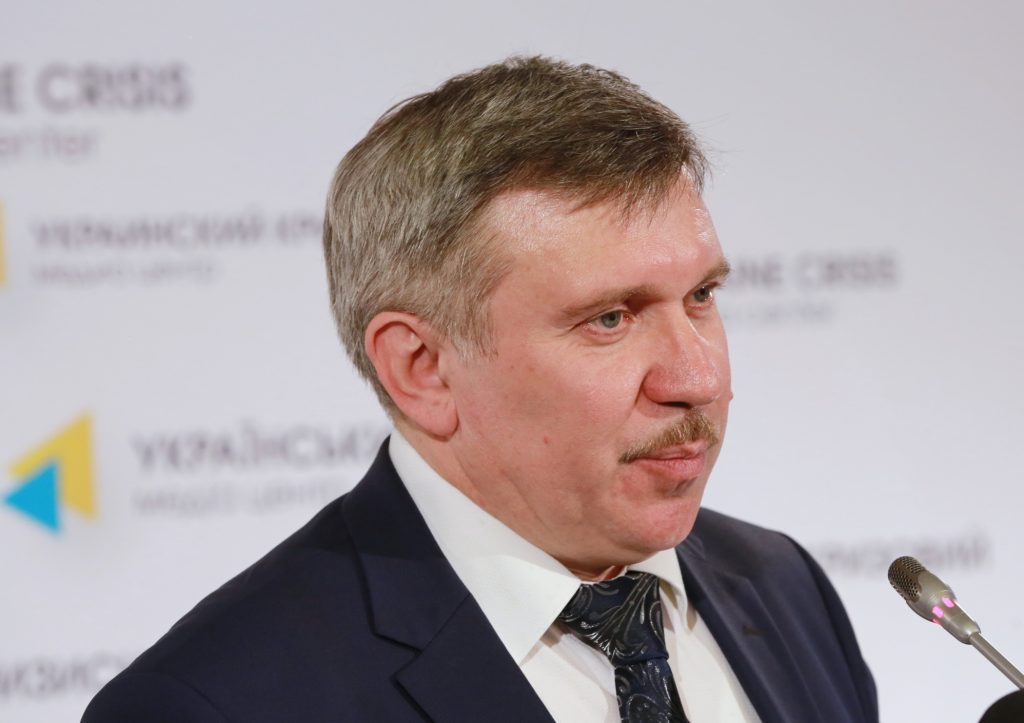Kyiv, 10 April 2014 – “By increasing pricing pressure on Ukraine the Russian Federation aims at making it recognize de jure the Russian status of Crimea. It’s a “Crimea or gas” strategy”, such an opinion voiced Mykhailo Gonchar, Director for Energy Programs at Nomos Center, at a press briefing by leading energy experts in the Ukraine Crisis Media Center. He also mentioned that Russia used a similar strategy in the mid 1990s when it appealed to artificial increase of the gas debt and used it to blackmail Ukraine, which in the end resulted in signing of the Accords on the Black Sea Fleet deployment in Crimea of 1997.
Oleksandr Narbut, President of the Kyiv Institute for Energy Research, thinks termination of Russian natural gas supply is quite possible in the nearest future as “Gazprom” will be requesting prepayment and “Naftogaz of Ukraine” NJSC will find itself unable to pay. The expert considers setting up reverse natural gas supply from Europe to substitute Russian gas being an urgent matter, although by the beginning of the next autumn-winter heating season the difference between consumption and own extraction will constitute only around 15mln cubic meters per day. The difference cab be covered by “physical” reverse capacities from Hungary and Poland, which make for almost 22mln cubic meters per day in toto. Nevertheless Ukraine has to enter the new heating season having already arranged for reverse gas supply from Slovakia, while relationship with the country is complicated due to inconsistency of previous governmental policy towards the Slovak partners, the expert thinks.
Also in Mr. Narbut’s opinion increase of own extraction “won’t produce immediate effect the next day but in any case will turn gas into real market product with pricing corresponding to supply and demand”.
As to the so-called “virtual reverse”, Mr. Narbut underlined that as it occurs without actual gas transit across the customs border of Ukraine Ukrainian gas transportation operator has to have the same functional system as respective companies operating in the EU. The Ukrainian state has to also introduce changes to its Customs Code which currently does not foresee customs clearance and registration of gas that does not cross Ukraine’s border as well as settle the procedures to allow for data exchange of the Ukrainian gas transportation operator with European gas suppliers.
Mykhailo Gonchar underlined that both Ukrainian and European partners will benefit from reverse gas supply. In addition to that the price at which Ukraine could purchase gas on European market constitutes around USD 270-280 per 1000 cubic meters of gas, which is even lower than USD 286 per 1000 cubic meters of gas – the price which Ukraine was paying until 1 April 2014 (for comparison – the price which Ukraine has to pay from 1 April 2014 constitutes USD 485 per 1000 cubic meters of gas).
Serhiy Dyachenko, Head of the Bureau for Comprehensive Analysis and Forecasting, noted that the price issue is closely tied to combating corruption in energy sector, in particular when state procurement is conducted. “The first thing that needs to be done on internal gas market, mentioned Dyachenko, is to introduce independent pricing expertise at least on the selective basis at the stage of state procurement as well as to improve the accounting system as regional gas enterprises are now mostly controlled by private companies”. Also according to the expert regional gas enterprises need be nationalized or at least 60% of shares need be purchased by the state.
Photo: dyvys.in

